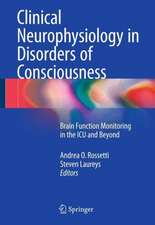Sepsis: Current Perspectives in Pathophysiology and Therapy: Update in Intensive Care and Emergency Medicine, cartea 18
Editat de Konrad Reinhart, Klaus Eyrich, Charles Sprungen Limba Engleză Paperback – 12 feb 2012
Din seria Update in Intensive Care and Emergency Medicine
- 5%
 Preț: 735.83 lei
Preț: 735.83 lei - 5%
 Preț: 408.44 lei
Preț: 408.44 lei - 5%
 Preț: 713.33 lei
Preț: 713.33 lei - 5%
 Preț: 723.42 lei
Preț: 723.42 lei - 5%
 Preț: 722.69 lei
Preț: 722.69 lei - 5%
 Preț: 738.06 lei
Preț: 738.06 lei - 5%
 Preț: 725.24 lei
Preț: 725.24 lei - 5%
 Preț: 376.22 lei
Preț: 376.22 lei - 5%
 Preț: 724.70 lei
Preț: 724.70 lei - 5%
 Preț: 723.78 lei
Preț: 723.78 lei - 5%
 Preț: 724.50 lei
Preț: 724.50 lei - 15%
 Preț: 589.95 lei
Preț: 589.95 lei - 5%
 Preț: 369.84 lei
Preț: 369.84 lei - 5%
 Preț: 715.35 lei
Preț: 715.35 lei - 5%
 Preț: 711.52 lei
Preț: 711.52 lei - 5%
 Preț: 724.14 lei
Preț: 724.14 lei - 5%
 Preț: 730.92 lei
Preț: 730.92 lei - 5%
 Preț: 375.34 lei
Preț: 375.34 lei - 5%
 Preț: 710.43 lei
Preț: 710.43 lei - 5%
 Preț: 367.84 lei
Preț: 367.84 lei - 5%
 Preț: 716.65 lei
Preț: 716.65 lei - 5%
 Preț: 378.97 lei
Preț: 378.97 lei - 5%
 Preț: 374.20 lei
Preț: 374.20 lei - 5%
 Preț: 1108.72 lei
Preț: 1108.72 lei - 5%
 Preț: 717.37 lei
Preț: 717.37 lei - 5%
 Preț: 2433.95 lei
Preț: 2433.95 lei - 5%
 Preț: 2680.79 lei
Preț: 2680.79 lei - 5%
 Preț: 2111.90 lei
Preț: 2111.90 lei - 5%
 Preț: 404.54 lei
Preț: 404.54 lei - 5%
 Preț: 726.68 lei
Preț: 726.68 lei - 5%
 Preț: 715.35 lei
Preț: 715.35 lei - 5%
 Preț: 740.58 lei
Preț: 740.58 lei - 5%
 Preț: 717.73 lei
Preț: 717.73 lei
Preț: 731.64 lei
Preț vechi: 770.14 lei
-5% Nou
Puncte Express: 1097
Preț estimativ în valută:
139.100€ • 146.56$ • 115.84£
139.100€ • 146.56$ • 115.84£
Carte tipărită la comandă
Livrare economică 05-19 aprilie
Preluare comenzi: 021 569.72.76
Specificații
ISBN-13: 9783642850387
ISBN-10: 3642850383
Pagini: 588
Ilustrații: XVI, 571 p.
Dimensiuni: 155 x 235 x 31 mm
Greutate: 0.81 kg
Ediția:Softcover reprint of the original 1st ed. 1994
Editura: Springer Berlin, Heidelberg
Colecția Springer
Seria Update in Intensive Care and Emergency Medicine
Locul publicării:Berlin, Heidelberg, Germany
ISBN-10: 3642850383
Pagini: 588
Ilustrații: XVI, 571 p.
Dimensiuni: 155 x 235 x 31 mm
Greutate: 0.81 kg
Ediția:Softcover reprint of the original 1st ed. 1994
Editura: Springer Berlin, Heidelberg
Colecția Springer
Seria Update in Intensive Care and Emergency Medicine
Locul publicării:Berlin, Heidelberg, Germany
Public țintă
Professional/practitionerCuprins
I. Definition/Prognosis.- Sepsis and Septic Shock: Update on Definitions.- Clinical Manifestations and Prognostic Indicators in Sepsis.- What Determines Prognosis in Sepsis? Evidence for a Comprehensive Individual Patient Risk Assessment Approach to the Design and Analysis of Clinical Trials.- A Scoring System for Multiple Organ Dysfunction Syndrome.- II. Pathogenesis.- Endotoxemia and Sepsis: Important Roles for Lipopolysaccharide Binding Protein and CD14 in Endotoxin Signal Transduction.- Bacterial Exotoxins and Sepsis.- Bacterial Translocation: Myth versus Reality.- Tumor Necrosis Factor and Other Cytokines in Septic Syndrome.- Role of Oxygen Free Radicals in the Pathophysiology of Sepsis.- III. Pathophysiology.- Cardiocirculation in Sepsis.- A Current View of Oxygen Supply Dependency.- Sepsis and Nutritional Blood Flow.- Endothelial Cell Function in the Critically Ill.- Sepsis and Cellular Metabolism.- IV. Monitoring.- Monitoring of O2 Transport and Tissue Oxygenation in Septic Shock.- V. Therapy.- Sepsis-Related Problems in Pediatric Patients.- Definitions and Therapy of Sepsis.- Role of Surgical Intervention in the Prevention and Therapy of Sepsis.- Antibacterial Treatment of Sepsis.- Diagnostic and Therapeutic Approach in Invasive Fungal Infections of Intensive Care Unit Patients.- Fluid Therapy in Sepsis.- Influence of Catecholamines on Regional Perfusion and Tissue Oxygenation in Septic Shock Patients.- Metabolic Changes in Sepsis — Can the Host Response be Influenced Metabolically?.- VI. New Therapeutic Approaches.- Is there a Place for Monoclonal Antibodies Against Endotoxin in the Therapy of Sepsis?.- Endotoxin in Septic Shock.- Tumour Necrosis Factor as a Therapeutic Target in Sepsis.- Tumor Necrosis Factor-Neutralization with a Specific MonoclonalAntibody.- Cardiovascular Effects of Repeated Administration of the F(ab’)2 Fragment of an Anti-tumor Necrosis Factor-? Monoclonal Antibody in Patients with Severe Sepsis.- Modulating Effects of Pentoxifylline on Cytokine Release Syndromes.- The Treatment of Sepsis with Interleukin-1 Receptor Antagonist.- The Function and Potential Therapeutic Value of Lipopolysaccharide Binding Protein During Gram- Negative Sepsis: Recombinant Expression and Promoter Studies.- Platelet-Activating Factor: Pathophysiological Changes and Therapeutic Implications in Sepsis.- Potential of Oxyradical Scavengers in the Therapy of Sepsis.- N-Acetylcysteine in Sepsis.- Immunoaugmentation: A Contribution to Prophylaxis and Treatment of Sepsis?.- What Is Certain in the Treatment with Immunoglobulins?.- Arachidonic Acid Metabolism in Sepsis: What is the Role of Cyclooxygenase Inhibition?.- Improvement of Monocyte Function A New Therapeutic Approach?.- From Localized Angioedema to Generalized Capillary Leak Syndrome.- Potential for Gene Therapy in the Treatment of Sepsis.- VII. Specific Therapeutic Aspects.- Step-by-Step Treatment of Acute Respiratory Distress Syndrome.- Perfluorocarbons as an Alternative Respiratory Medium.













